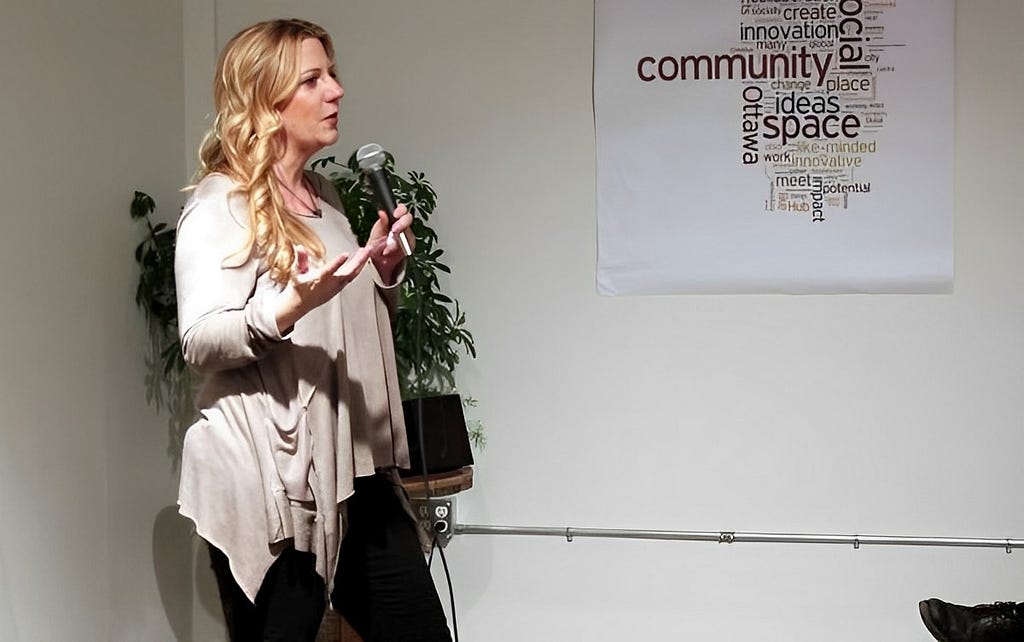Anastasia Valentine of Carpe Omnia Group On Five Things You Need To Create A Highly Successful Career In The AI Industry

Ability to work at the speed of AI — AI is evolving and innovating faster than anything. It would help if you were on board for a high-speed, constantly changing ride. What I can promise you is that it will never be boring!
Artificial Intelligence is now the leading edge of technology, driving unprecedented advancements across sectors. From healthcare to finance, education to environment, the AI industry is witnessing a skyrocketing demand for professionals. However, the path to creating a successful career in AI is multifaceted and constantly evolving. What does it take and what does one need in order to create a highly successful career in AI?
In this interview series, we are talking to successful AI professionals, AI founders, AI CEOs, educators in the field, AI researchers, HR managers in tech companies, and anyone who holds authority in the realm of Artificial Intelligence to inspire and guide those who are eager to embark on this exciting career path.
As part of this series, we had the pleasure of interviewing Anastasia Valentine.
Anastasia Valentine is a highly accomplished and award-winning technology leader widely recognized in the industry for her expertise. Throughout her impressive 32-year career, she has played a pivotal role in the growth and success of numerous companies in various technology fields, including business intelligence, artificial intelligence, voice, finance, and more. Today she focuses on leading and advising AI centric startups and scaleups from idea through to commercialization.
Thank you so much for joining us in this interview series! Before we dive in, our readers would like to learn a bit about your origin story. Can you share with us a bit about your childhood and how you grew up?
Can you share with us the ‘backstory” of how you decided to pursue a career path in AI?
A career in AI was not a decision, it just happened. With AI being so important to the development and innovation of technology, it just made sense that we gravitated towards each other and I began working with some amazing companies leveraging AI very early on to right now, running my own AI company.
Can you tell our readers about the most interesting projects you are working on now?
I’m currently working on some fun projects with generative AI and NLP. This space has so much action, and innovation is happening so rapidly. It’s a thrill to be involved in this part of the technology industry and lead an AI company, AI Social Media Builder (https://www/.smbuilder.co ). My company helps people create social media posts and email content in seconds. There are so many directions we can go from here, so the goal right now is to work with our customers and trial users to see their needs and delight them.
As with any career path, the AI industry comes with its own set of challenges. Could you elaborate on some of the significant challenges you faced in your AI career and how you managed to overcome them?
The biggest challenge is developing competitive, high-quality AI capabilities that add value and will have longevity. The speed of AI innovation is something we have never seen. Keeping up and staying ahead of the curve will always be a challenge, but that is one of the most exciting parts of the game!
Listening to customers, collaborating with fellow founders, whether in informal sessions, sharing battle scars and aha moments or even commiserating, sometimes generates some of the best ideas and solutions to problems to solve with AI.
Ok, let’s now move to the main part of our interview about AI. What are the 3 things that most excite you about the AI industry now? Why?
Ai is exciting because it can be used for many practical purposes and impractical or fun activities. The top 3 reasons I’m excited about AI are:
- Speed of innovation. I am seeing awesome companies and talented developers building things proactively and at lightning speed!
- Improving life as we know it. From healthcare to government to finance, AI has the power to optimize traditionally somewhat inefficient systems and create opportunities for users, organizations, and institutions to make incredible strides in delivering better and more optimized services than ever before.
- Acknowledgement and tackling of AI bias and improving ethics. AI bias is real. AI only knows what it has been taught. As AI developers and innovators, we are responsible for creating solutions that represent and serve all people in our communities. Eliminating bias and making ethical data decisions should always be the foundation of our work with AI.
What are the 3 things that concern you about the AI industry? Why? What should be done to address and alleviate those concerns?
While AI has the power to do amazing things for humans, at what cost? The problems we need to be concerned about and need to solve are:
- A standard of ethics. Moral codes and ethical decisions about data, model creation, training and AI-driven solutions are human decisions. If there is no consideration of where data comes from, how it is generated, how it is used, where and how it is shared, who is accessing it and how often it is updated, the AI solution that leverages that data is compromised at the risk of breaking confidentiality or privacy understandings or even laws and putting its foundation as a valid AI at risk. Creating a standard of ethics and adhering to it on a large scale and individual company level and being fully transparent with policies and procedures regarding data acquisition and usage is a great way to start.
- Bias — Creating AI solutions based on a subset of data from a slice of the population when it is meant to serve a larger audience creates a substandard AI. AI developers and architects must include eliminating bias when creating their solutions so the data is complete and can serve a greater population.
- Transparency — AI development’s “black box” mentality needs to be discarded. Information can be shared to support the robustness, efficiency, bias reduction and ethics that don’t give away an AI solution’s secret sauce. Building an AI product, solution and service with transparency in mind from the beginning will result in early adopters, users and customers having a higher level of trust and, thus, higher and faster adoption.
For a young person who would like to eventually make a career in AI, which skills and subjects do they need to learn?
Data science, ethics, privacy and security, and user experience would be my choices for subjects and skills for anyone looking to build a career in AI. In addition, anyone who wants to pursue a path in AI needs to be prepared for radical and rapid change in the field from a technology and legislative perspective and be willing and able to pivot and adapt quickly.
As you know, there are not that many women in the AI industry. Can you advise what is needed to engage more women in the AI industry?
Getting more women or those who identify as women in the industry goes back to introducing science, technology, engineering and mathematics (STEM) subjects to children at a young age. This way, they will view this as a possibility and an encouraged career path without being intimidated or funneled into more traditional roles. This has to follow through in grade school, secondary, post-secondary and all the way to doctoral studies to retain interest and commitment to following through into a career in AI. With that support, we will see more women in AI.
Ethical AI development is a pressing concern in the industry. How do you approach the ethical implications of AI, and what steps do you believe individuals and organizations should take to ensure responsible and fair AI practices?
Individuals need to align themselves with organizations that take ethics in AI and transparency seriously. It’s easy and faster to create solutions without checks and balances, but creating more robust and trustworthy AI solutions with integrity and adherence to ethics is better.
Companies must first acknowledge the significant challenges with AI development and usage, including reducing and eliminating bias, implementing responsible data practices, prioritizing data privacy and security and committing to transparency. This can get tricky when combined with the speed of innovation, creativity and competition. Still, the company is responsible for striking a balance and delivering ethical solutions to the market.
Users must demand that the organizations creating AI products provide them with proof or a framework they are committed to following that ensures the solution is not biased, the data was gathered and used ethically, privacy is respected, data security is implemented, and development is transparent. Specifically, users need to speak with their wallets. If the organization can’t, won’t or doesn’t produce their commitments and frameworks to show their ethical, data and privacy practices, don’t buy.

Ok, here is the main question of our interview. Can you please share the “Five Things You Need To Create A Highly Successful Career In The AI Industry”? If you can, please share a story or an example for each.
Individuals need to align themselves with organizations that take ethics in
1 . Curiosity and creativity- AI can be used in many ways. Be creative and approach with an anything is possible mindset while looking for the right company fit or building an AI solution.
2 . Adaptivity — AI can change overnight and sometimes even faster. Anyone looking for a career in AI must think ahead of the current moment, adapt to changes that affect you and your product or organization, respond quickly to challenges and solve problems.
3 . Commitment to ethics — Being a trailblazer comes with responsibility. AI can give us anything we want, but should it? Commit as an individual, innovator and consumer to ethical AI and be proud of what you stand for and who you stand with.
4 . Being a trailblazer — It takes a particular person to blaze a new trail and an element of fearlessness to try something new. With a career in AI, you will always be working on something new, creating something that can be life-changing for you and others. Go forward with confidence!
5 . Ability to work at the speed of AI — AI is evolving and innovating faster than anything. It would help if you were on board for a high-speed, constantly changing ride. What I can promise you is that it will never be boring!
Continuous learning and upskilling are vital in a dynamic field like AI. How do you approach ongoing education and stay up-to-date with the latest advancements in the AI industry? What advice do you have for those looking to grow their careers in AI?
Always be learning. What you learned about AI a year or two ago may no longer be as relevant. It would help if you stayed on top of what is happening in the market from a technology, ethics and innovation perspective. Make sure your learning comes from a variety of sources like mentors, trailblazers, watching other companies that you admire and doing groundbreaking things with AI, going back to school (I recommend 1 course per quarter at least while you are in the workforce), and establish a peer group of people who are active in AI in different capacities.
What is your favorite “Life Lesson Quote”? Can you share a story of how that had relevance to your own life?
“Be the change you want to see in the world.” It’s been attributed to Ghandi, but there is a dispute. In any case, change only happens once someone makes it happen. If there is something you don’t like, change it. Make it happen. If we are complacent and always accept the hand we are dealt, we will never advance, evolve or change. We will never innovate, create and grow. Be the change and inspire others to do the same.
How can our readers further follow your work online?
Join me on LinkedIn at https://www.linkedin.com/in/anastasiavalentine/ and try out our AI Social Media Builder content assistant tool at https://www.smbuilder.co.
This was very inspiring. Thank you so much for joining us!
Anastasia Valentine of Carpe Omnia Group On Five Things You Need To Create A Highly Successful… was originally published in Authority Magazine on Medium, where people are continuing the conversation by highlighting and responding to this story.
